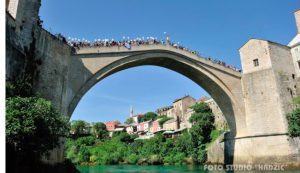… EDUCATION FOR PEACE …
An article from the United World Colleges
This year, graduation season has been particularly special for the whole community at UWC Mostar, which has just celebrated its 10th year anniversary! UWC Mostar was established against the background of the violent breakdown and division of former Yugoslavia along ethnic and religious lines that occurred between 1991 and 1995. During the conflict, over 140,000 people died, over 50% of the population was displaced and over one million people sought refuge in other countries. In this context, the opening of UWC Mostar not only provided a new educational model that was radically different from the prevailing national educational system in place since the war, but it also demonstrated the relevance of the UWC mission in the 21st century: using education as a force for a more peaceful future.

Click on photo to enlarge
In fact, since the war, UWC Mostar was the first school in Bosnia and Herzegovina having students from across the country being taught by the same teachers and in the same classroom. This deliberately inclusive educational model, which makes students from all backgrounds work and learn together, was – and is – very different from the segregational educational system still prevailing across Bosnia and Herzegovina (BiH) today. Pilvi Torsti, Chair of the Foundation Education in Action, UWC Adriatic graduate from Finland and one of the master minds behind starting UWC Mostar, underlined the active role of the college in fighting this model and make education a means for peace among people: “The wider influence of the work has even led to court rooms: UWC Mostar has been used to make the case against segregated educational system in this Canton. It is a miracle that we are all here today”.
UWC Mostar’s mission was and continues to be a most relevant one: to equip the next generations of young people in Bosnia and Herzegovina with the knowledge, skills, leadership qualities and international values, necessary to bridge the still existing ethnic divisions and move their country into a more peaceful future. But UWC Mostar has become much more than a model for inclusive education for young people from Bosnia and Herzegovina: its student body includes individuals from all over the Balkans and from countries across the world, with a special emphasis on students from post-conflict countries.
(Articles continued in right column)
Where is peace education taking place?
(continued from left column)
Mary Ann Hennessey, Head of Office of the Council of Europe in Bosnia and Herzegovina and member of the Board of the College Foundation, who took part in the recent celebrations for the college’s 10 year anniversary, underlined: “From 2006 the United World College Mostar has been enrolling students from BiH and from around the world, providing an example of openness and diversity which lies at the heart of a modern, student-centred education. In doing this, and building relationships with local educational partners, UWC Mostar contributes to the transition from a post-conflict society to a society which can make a success of the European integration process, and eventually transition to a genuine modern, European Union economy, society and polity”.
UWC Mostar’s inclusive approach is also reflected in the words of Jasminka Bratić, Chair of UWC Mostar Board, who commented: “Mostar was the right place for founding a college. The College where children are educated about mutual differences in the atmosphere of equality and tolerance, where they are taught to respect those differences, to develop their critical thinking, creativity, social compassion and responsibility”. She also added: “Not long ago Bosnia and Herzegovina has applied for EU membership. But Mostar can boast about having its own UNITED NATIONS for the past ten years, where people of different cultures, nations, religions and traditions live and work in peace and harmony within the city and Gimnazija building”.
Being situated in a city which was divided by the war, UWC Mostar consciously spread its residences across the city to enable the students to integrate with different communities – and to become a living proof how people can live together independent of their ethnic, religious, national or linguistic background. Today, it is the interaction of students with the local community which has become the essence of UWC Mostar and one of its most unique characteristics. By establishing its community service programme in cooperation with more than 15 institutions and associations in Mostar, UWC Mostar gave impetus to the development of a community of volunteers in a society in which voluntary work was not firmly established. Sharing one school building with a local school and through scientific fairs and competitions, UWC Mostar played a key role in gathering students and teachers from both the Bosniak and Croat side of the educational system to work together.
This year, UWC Mostar is celebrating 10 years of work and achievements – and the whole UWC community celebrates with them! During the celebration, Pilvi Torsti, shared her thoughts on the past and the future of UWC Mostar: “So dear guests, this is what I wish all of us to recognise today: UWC Mostar celebrates today 10 years of start-up history, start-up mentality, start-up people. That start-up has educated almost 800 students (including current 1st years). 1000 Bosnian teachers have taken part in workshops. Now it is the challenge to turn the start-up into a long term successful venture with many new ‘firsts’. And that is the challenge for you all – there is nobody somewhere out there to do it but you!”
(Thank you to the Global Campaign for Peace Education for calling this article to our attention)